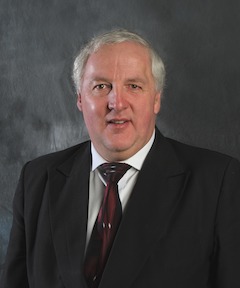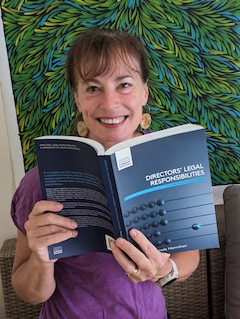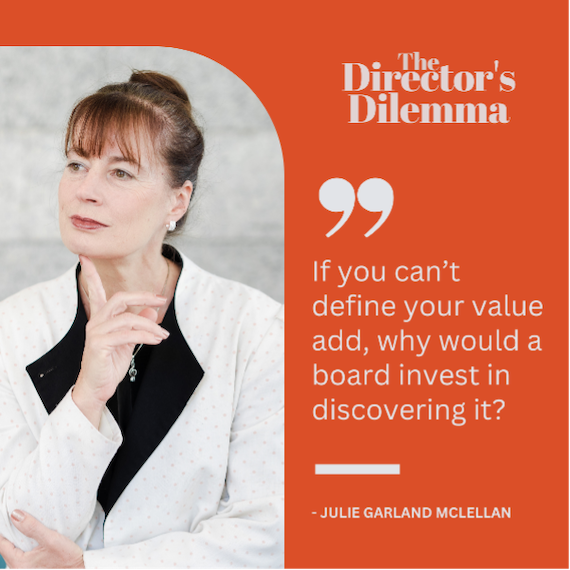|
|
|
|
|
|
|
|
|
Dear reader,
Welcome to The Director's Dilemma April 2023
Each month this newsletter looks at a real-life scenario that happened to a board, perhaps to a board like yours, and considers a range of responses. The scenarios are de-identified to protect the individuals concerned. This month we consider the fraught situation of a board that doesn't control its own composition and has an ineffective chair.
Of course, scenarios in this newsletter are general, I work with boards and directors as a confidential mentor and help them beat challenges and seize opportunities. If you would like personalised service, please call me.
To read this email in a web browser, go to www.mclellan.com.au/newsletter.html and click on 'read the latest issue'. I hope you will enjoy the latest dilemma:

Bill joined the board of a government sector agency. He is passionate about the sector and excited by the aims of the enterprise, which have the potential to do great good.
All directors are Ministerial appointments, and the board is composed of people with deep industry expertise. The Chair is a prominent academic with a tremendous depth of knowledge about the industry and its participants as well as the technologies that are currently driving progress.
Unfortunately, although he is a great 'people person' as well as a great expert, the Chair is not a good organiser, and the meetings are a mess. The agenda is rarely adhered to, discussions wander down side tracks, there is no summing up of the progress made in understanding the issues, people come in and out of the meeting, sidebar conversations are almost ubiquitous, and there are almost no decisions or guidance for the executives.
The minutes, which are made public, are mercifully minimal.
However, Bill is concerned that on a couple of occasions management have done things that they were not expressly delegated to do and have pointed to the board minutes (which mention that the topic was discussed) as providing authority for making commitments (which is definitely not mentioned).
The Chair has been appointed for a four-year term and Bill is not sure that he can cope with three more years of this.
How can he help his board and his chair to lift performance and start governing as they should?
|
|
|
|
Carolynn's Answer

A well-crafted assessment will bring light to the problem at hand. Although this will not be a quick solution, it will be the most beneficial for all concerned as the board can work collectively to raise and address problem areas. Bill should raise the requirement for a board performance assessment and work with the person responsible for assisting the board in governance matters to ensure that the matters he is most concerned with are raised in this assessment.
A board should assess its performance regularly. This has been agreed internationally as a condition for good governance. ISO 37000:2021 Governance of organizations - Guidance recommends that: "The governing body should: assess its own competence, structures and processes, including drawing on the support of experienced, independent professionals, with respect to, for example, the adequacy of its effectiveness, efficiency, composition and its member succession plans". The standard also guides that: "Effective delegation and transparent decision-making empower personnel to act appropriately, resulting in a more resilient and agile organization."
It is the latter that seems to be at the heart of Bill's concern - the Board Chair seems not to be facilitating the activities and discussions of the board towards effective decision-making and in consequence the organization's personnel are not empowered to act appropriately. An ideal outcome from the assessment would be:
(i) the effective application of engaging Board training on effective decision-making and delegation, and
(ii) improved Board discussions with effective Board Chair facilitation as the result of an intervention (such as training, coaching or mentoring of the Board Chair) to this end.
Carolynn Chalmers is Chairman of the National Member Body Mirror Committee for the ISO South African Technical Committee on the Governance of Organizations, CEO of The Good Governance Academy and its subsidiary The ESG Exchange, and Executive Director of Candour Governance. She is based in Gauteng, South Africa.
|
|
|
|
Julie's Answer
 Bill is in a bind. He needs to do something to help the board become effective so he must be courageous. Bill is in a bind. He needs to do something to help the board become effective so he must be courageous.
The first person to talk with is the chair. A simple, "How are you enjoying the role? How do you feel the board is progressing?" conversation in as social and unthreatening a situation as Bill can create.
It is quite possible that the chair is aware of the issues but lacks the courage to address them. In that case, Bill can offer to support the chair by helping to run the meetings.
A chair doesn't need to chair the meetings; they can bring in an external facilitator, or can use a director to do that. This is extra important when the chair is the industry expert and the board needs their deliberative input. You can't easily chair and contribute to discussions at the same time!
He should raise his concern about management acting without authority. This could be dangerous for the board and chair (especially if the chair would like to be reappointed).
It is also possible that the chair is unaccustomed to meetings that need to reach many decisions within a timeframe. A board is there to decide, not to safeguard academic rigour in the papers. Perhaps training or mentoring would help. There are some great courses and mentors available.
The next people to talk with are his colleagues and management. Depending on the operating culture and protocols this may be easy or fraught. A board performance review may help to gather information while protecting anonymity. External reviewers can also deliver challenging outcomes and then leave so no-one in the board or executive has their relationship strained by having been the bearer of that news. Neither board not management should accept the risks of acting without board authority.
If all of the above fail; Bill can talk to the Minister. That is the nuclear option.
The good news is that Bill has options. He just needs to be brave and take some actions.
Julie Garland McLellan is an experienced non-executive director and board advisor based in Sydney, Australia.
|
|
|
|
Kevin's Answer

This scenario touches on Director competencies on Boards. This is a challenge experienced by many public and private sector Boards.
Appointing Board Members is as much an art as a science. This especially applies to Chair appointments. Leading-edge technical competency, outstanding personal reputations and affable personalities are not always hallmarks of good leaders or board members. We have often been asked to advise Boards how they should deal with competency issues and in particular ageing Board Members with deteriorating mental health.
As a benchmark, show me a good Board and I will show you a great Chair. Our research shows that the Chair is the single biggest determinate of a Boards performance. Great Chairs are often experienced leaders who can effectively and efficiently utilize the skills, experience and knowledge of the other Board Members in the governance of an organization.
The Board Skills / Experience Matrix and fit should both drive board appointments and well-informed decisions on whether to join a Board. Most often new Board Members will look to the Chair as a significant factor in the final decision to join a Board.
Unfortunately, the Chair is not a position from which to learn basic board leadership skills. In this case courses, education or training won't cut it. The lack of competency by the Chair is putting the organization and the Chairs own reputation at risk.
Bill's concerns are most likely recognized by other Board Members. These concerns could also have been raised during in-camera discussions and in an annual Board Assessment. Bill must raise his concerns with the Chair of the Governance Committee. It is then that Chairs responsibility to address the issue with the Chair and the Government Stakeholders as appropriate. Most likely resulting in the appointment of another Chair and moving the current Chair into a Past Chair role.
Kevin Hall is the Canadian Managing Partner of Bluestone Leadership Services, a member of the AltoPartners Global Board, and a board member and former chair of Youthlink Calgary Police Interpretive Centre. He is based in Calgary, Canada.
|
|
|
|
Video resources - I post short video insights on LinkedIn. They disappear after a few days. You might like to visit (and please subscribe to) my YouTube channel to see the videos whenever you want to watch them. Let me know if there are any topics you would like to see addressed.
Confidential chair mentoring - stepping up to take on the role of chair is daunting. It requires a combination of many different skills that can be difficult to learn. If you would like to have a confidential discussion about how to arrange mentoring support for your board chair, please book a time using this link: https://calendly.com/julie-gm/confidential-chair-mentoring-discussion
It's so great to meet in person - I was at the AICD Australian Governance Summit in Melbourne on 1 and 2 March and really enjoyed meeting so many of you whom I had not met before. I'm writing this from the Professional Speakers Australia Conference 2023 (anyone who speaks to boards should have professional expertise in speaking as well as in their topic). I will next be at the Better Boards conference in Brisbane on June 2 and 3. Please come and say hello if you see me there. I always love meeting new people and catching up again with ones I have met before.
Book Review - Directors' Legal Responsibilities by Pamela Hanrahan
 Pamela's sessions at the AICD Governance Summit are a clear highlight of the event. This year, the conference organisers put her on last. Yes, it guaranteed that many of us stayed because we really wanted to hear what she had to say about recent legal cases and their implications for us. But, it meant we stayed with our minds constantly worrying about catching flights home. (Unless you were lucky and lived in Melbourne). Pamela's sessions at the AICD Governance Summit are a clear highlight of the event. This year, the conference organisers put her on last. Yes, it guaranteed that many of us stayed because we really wanted to hear what she had to say about recent legal cases and their implications for us. But, it meant we stayed with our minds constantly worrying about catching flights home. (Unless you were lucky and lived in Melbourne).
Fortunately for every director in in Australia, and a few overseas, Pamela has produced a great source of useful reference for directors. Anyone who missed, or wants to retain and expand, the knowledge she shared at the summit can take it home and keep it forever handy.
The book is not quite as easy to read as the 'plain English' claims suggest. It is laid out in a way that allows the reader to either start at the beginning and continue to the end, or to dip in and research topics as they become relevant to their board. There are good footnotes and a helpful index.
Available from AICD in either print or e-book format.
Inspirational quote for April

Good is not good enough. If you are on a board, you need to focus on the precise areas where your ability to contribute is needed and unsurpassed by any other available sources. Yes, we all can contribute widely. But no, we shouldn't all contribute on every topic. If you are aspiring to join a board, knowing your best areas of contribution is crucial. And if you aren't sure, you need to ask until you know.
A note on names - A few readers have asked me where I find the names for the protagonists in each case study; I 'borrow' them from people I meet or things that I read. 'Bill' is an old English name, short for William and it means 'Resolute Protector'. Our protagonist Bill will need to be resolute as he protects and hopefully improves the effectiveness of his board.
This newsletter - If you have any ideas for improving the newsletter please let me know. If you are reading a forwarded copy, please visit my website and sign up for your own subscription.
Let me help you - I would be delighted to speak for or train your board, staff, audience and/or group. If I can help, please contact me at julie@mclellan.com.au.
Suggestions for dilemmas - Thank you to all the readers who have suggested dilemmas. They are greatly appreciated. I will answer them all eventually. I could not write this newsletter without your help and without the generous help of all the experts who respond each month to the case studies.
Be a contributor - if you would like to attempt a response to the dilemmas for publication you will be most welcome. Simply reply to this email and let me know. I am always on the lookout for new talent from around the world so please reach out if that sounds like something you could do. I am also always grateful for the generous sharing of the current and past contributors. I couldn't create such an engaging newsletter without their help.
Let's connect - I use LinkedIn to share information about boards and directorship with my friends and acquaintances. If you use LinkedIn and we are not yet connected I will welcome a connection from you. You can find me at linkedin.com/in/juliegarlandmclellan.
Farewell until the next issue due 1 May. I look forward to greeting you again then.
Enjoy governing your companies, it is a privilege!
Best regards,
Julie

Main photo by Energepic.com
Quote illustration Keitchy Sanchez for Julie Garland Mclellan
Disclaimer: The opinions expressed above are general in nature and are designed to help you to develop your judgement as a director. They are not a definitive legal ruling and do not constitute legal advice. Names and some circumstances in the case study have been changed to ensure anonymity. Contributors to this newsletter comment in the context of their own jurisdiction; readers should check their local laws and regulations as they may be very different.
Privacy: I am privileged to have your contact details and keep them as safely as possible. I will alert you if they are ever accessed by any unauthorised person (the technical staff at ayuda help with publishing and issuing the Director's Dilemma and have access so they can send the newsletters to you). I do not sell your details to anyone; they are kept only for the intended purpose - sending you this newsletter and helping to build the judgement of company directors by providing a safe way to consider potential responses to real life events.
|
|
|
|
|
|
|



 Bill is in a bind. He needs to do something to help the board become effective so he must be courageous.
Bill is in a bind. He needs to do something to help the board become effective so he must be courageous.


